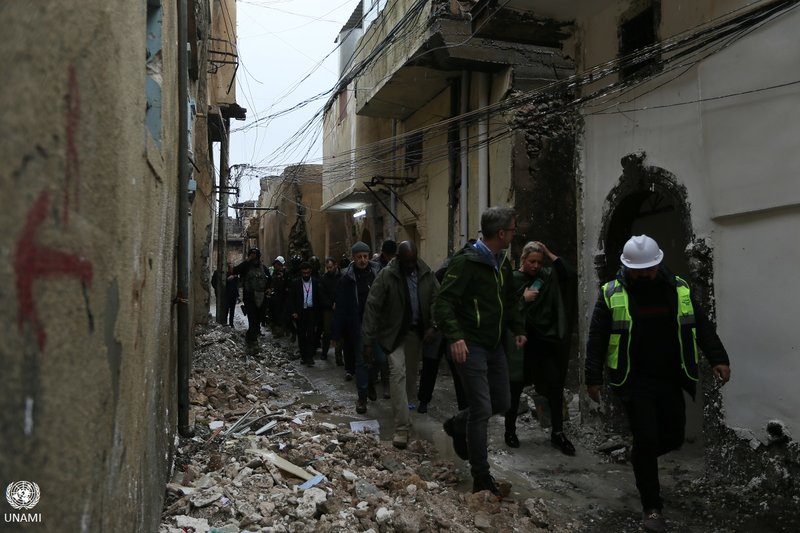The United Nations Assistance Mission for Iraq (UNAMI) was established by Security Council resolution 1500 (2003) at the request of the Government of Iraq, revised under resolution 1770 (2007) and has since been extended on an annual basis.
The current mandate of UNAMI encompassesa number of key areas, including the provision of advice, support and assistance to the Government and the people of Iraq on advancing inclusive political dialogue and national and community-level reconciliation; electoral support; as well as facilitating regional dialogue and cooperation; promoting accountability and the protection of human rights and judicial and legal reform; gender mainstreaming; and promoting coordination and facilitating, in coordination with the Government of Iraq, delivery in the humanitarian and development areas. Furthermore, under Security Council resolution 2107 (2013) UNAMI is mandated to promote, support and facilitate efforts of the Government of Iraq regarding the repatriation or return of all Kuwaiti and third-country nationals, or their remains, and the return of Kuwaiti property, including the national archives.
The UN Country Team is working together to improve the lives of Iraqis across numerous sectors. Under the auspices of the UN Sustainable Development Cooperation Framework (UNSDCF, formerly UNDAF) for Iraq 2020-2024, in line with Iraq’s national priorities and in accordance with the National Development Plan and the Sustainable Development Goals, agencies, funds and programmes are working to assist the Iraqi Government towards achieving social cohesion, social protection, and social inclusion to create a fair and inclusive society for all Iraq; growing the economy for all Iraqis; promoting effective, inclusive, accountable and efficient institutions and services at all levels; promoting natural resource and disaster risk management, and climate change resilience to achieve a better, safer and more sustainable future for all; and achieving dignified, safe and voluntary durable solutions to displacement in Iraq.
Key Areas of UNAMI’s Support Role
UNAMI is supporting the government’s efforts to promote an inclusive dialogue among political actors, including through broad engagement with institutional stakeholders and civil society and the provision of advice and recommendations on key policy issues. UNAMI also promotes regional cooperation and dialogue between Iraq and neighbouring countries through its good offices mandate. Since 2021, UNAMI has increased its advisory and technical assistance role in countering adverse impacts of climate change, including on water scarcity, desertification and drought, together with the UN Country Team.
UNAMI played a key support role in the process by which Iraqis drafted and adopted a new constitution in 2005, and assisted the country in holding national elections as well as Iraq Governorate Council elections and parliamentary elections in the Kurdistan region of Iraq since 2009. Since the formation of the Independent High Electoral Commission in 2007, the United Nations has continued to provide technical support, policy advice and assistance to the institution. In 2021, in line with Security Council Resolution 2576 (2021), UNAMI implemented one of the United Nations’ largest electoral assistance projects worldwide, in support of the 10 October parliamentary elections, encompassing technical assistance and the deployment of 150 United Nations international electoral experts in advance of, and on, election day.
UNAMI assists the Government of Iraq in promoting accountability for human rights violations and protecting human rights in Iraq to build and strengthen trust among the Government, justice institutions, civil society and communities. UNAMI is also working in partnership with other United Nations, Government and civil society partners, to provide technical assistance, legal and expert advice on content and implementation of Iraq’s international human rights obligations, and on drafting legislation, regulations and policies that promote the respect and protection of human rights, and assist with building the capacity of state institutions, including relevant ministries, the Council of Representatives, the Iraqi High Commission for Human Rights, and law enforcement and the administration of justice.


